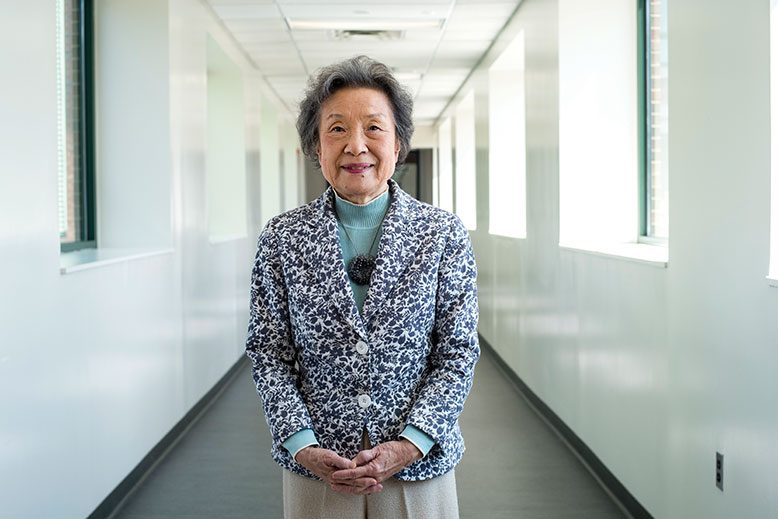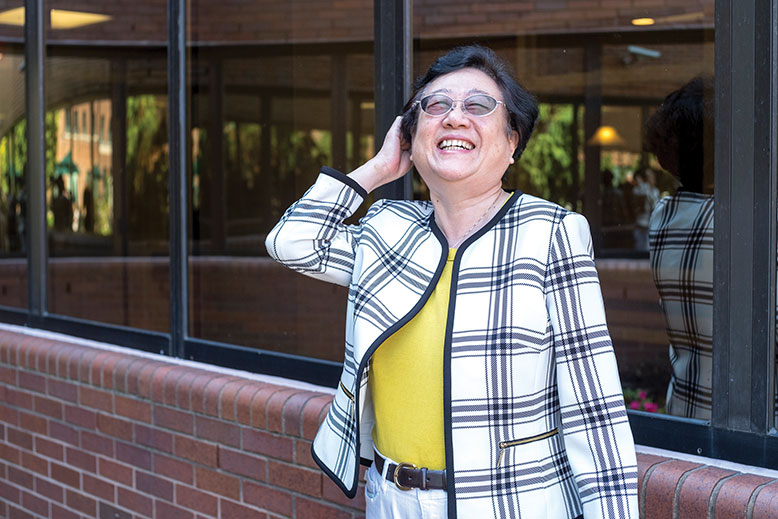
Adult day care centers have proliferated across the county in recent years, providing not just medical care but camaraderie. “Socializing is very important to them,” says Suryakant Shukla, 78, chairman of the advisory council for the county’s Department of Senior Services. He responded to questions about the longevity cluster by compiling a brief report to share with the council. The report identifies seven factors: food habits, lifestyle, genetics, education and health habits, economics, location and faith. “They’re not astute in doing the Internet and social media, but they still like to communicate with each other.”

“I have very serious control of my food.” — Huiming Wang, 72. Photo by Ed Kashi/VII
At Atmiya Adult Day Care in Elmwood Park, where the clients are mostly Indian, mornings start with Hindu prayers. “Women follow their daily activities in more of a pattern than men,” says the owner, Jay Patel. “Retired men don’t even have patterns; they don’t follow the system.”
After prayers come 30 minutes of yoga adapted for aging bodies—no mats, just standing or sitting. “I feel more energy, I’m able to run and run, and I have a good night’s sleep,” says Sushila Desai, 70, through a translator. She does yoga at Atmiya and then twice more again at home. Her mother lived to 93, her mother-in-law to 96; her goal is 100. “I learned from them.”
Desai, who arrived from India 15 years ago to help care for her grandchildren, lives in Fair Lawn with her daughter, who owns a convenience store. She spends Sundays at a Hindu temple in Clifton, and each night before bed, she puts dried black grapes in water to soak until morning, when she eats them. “I’m always thinking positive thoughts, no negative thoughts while I’m eating,” she says. Her diet is vegetarian—no seafood, eggs or gluten. No onion or garlic, either. “Whatever you eat that’s what you’re thinking in your mind. Our religion says don’t eat onion and garlic because they don’t give you good thoughts. They make you have negative thoughts. We’re never angry with someone right away. People who are eating that type of food, like onion and garlic, they are angry.”
Huiming Wang watches her diet closely, too, and has her blood sugar checked daily at the Home Away From Home Adult Day Care Center in Nutley. Her father, who lives in Shanghai, is 96, but her mother, who had diabetes and heart disease, died at 72, the same age she is now. She also has diabetes. “I manage it closely,” she says through a translator. “I have very serious control of my food.”
Managing a chronic disease like diabetes is easier in a place like Bergen County. “It’s not that they’re not getting the same diseases, it’s not that they’re skipping the diseases that kill people when they’re younger, it’s just that they’re able to live longer witwh those diseases,” says Dr. Teri Katz, who sees Asian patients as part of her geriatrics practice in Fort Lee, the Center for Dynamic Aging. Bergen, she notes, is where the diets and lifestyles of the old countries intersect with the amenities of the new, especially the extensive health care system. “All of those are contributing factors that are probably allowing this pocket to live longer with the same diseases.”
Wang and her husband were engineers in China, and they joined their daughter and her family here after they retired. “Every Saturday they all come to my home for lunch,” says Wang, who lives with her husband in a senior apartment in Passaic. They have two grandchildren; the older one, whom she proudly points out in a recent photo, is just off to her first year at Cornell University. “I want my daughter and granddaughter to learn how to cook typical Chinese food.”
Wang has help managing her diabetes through the Chinese Medical Program at Holy Name Medical Center. Koreans are the predominant Asian group in Bergen County (44 percent of the county’s Asian population) and were the focus of the program Kyung-Hee Choi started after leaving her Wall Street career in the wake of 9/11. (The second plane was so close as it roared past her office at J.P. Morgan, she said, “it felt like I could open the window and touch it.”) Over the last two years, Holy Name has opened four more programs for Chinese (13 percent of Bergen’s Asian population), Indian (19 percent), Filipino (15 percent) and Japanese (5 percent) residents.
“I’m a first-generation immigrant myself, so I put myself in their shoes and understand what obstacles they face,” Choi says. “They don’t have to worry about not speaking the language, not being able to communicate, not being able to eat the Western food.”
At Holy Name Medical Center, traditional practices are accommodated. Korean women who have just delivered babies get seaweed soup and avoid rooms with the number four, the word for which sounds like death in Chinese and several other East Asian languages. If hospitalized, Asian patients drink the warm water they prefer when sick, not ice water, and eat Asian food instead of french fries. Translators are abundant, health fairs and screenings are offered at churches and community groups, and 280 Asian doctors are affiliated—“More than any other hospital in the country,” Choi says.
“That korean community, in their 70s, 80s, 90s—most of them were well into adulthood and middle age by the time they came here, so they were set in their ways culturally, dietary-wise and socially,” says Dr. Hee Yang, medical director of Asian Health Services at Holy Name. “They brought that same great lifestyle to the United States, and then you add to that the modern health care they had access to here, and I think that contributed significantly. I would like to think that elderly Korean patients having access to what we’ve created contributed to their longevity as well.”
But all that health care can only help them if you get them in. “Going to the hospital is intimidating in and of itself and then you add linguistic and cultural barriers, and it’s almost prohibitive,” says Yang. “I’ve been through that experience myself. I know how intimidating it is.”
Yang knew no English when he moved from Korea to Chicago with his family at the age of 12. A year later, his grandmother arrived, and he was deputized as her escort when she had some health problems, riding the bus with her to clinics and translating for her with the nurses and doctors. “I made a promise to myself that, if and when an opportunity came for me to do something about this, I would,” he says.
And his grandmother? “She lived into her 90s,” he says.
Kevin Coyne is a frequent contributor to New Jersey Monthly.



